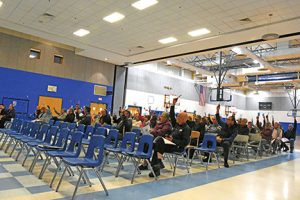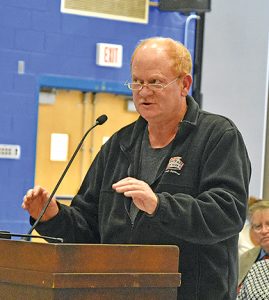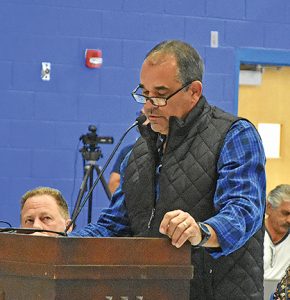
Voters pass a bylaw that would regulate large scale solar arrays at Acushnet’s Special Town Meeting on 10/17/22. Photo by Beth David.
By Beth David, Editor
Voters passed all articles at the Acushnet Special Town Meeting (STM) on Monday, 10/17/22, most with no discussion.
Article 2 totalled $44,472.57 to correct budgets in the current fiscal year. The article included taking $136,788 from the School Department’s budget to rectify an error with the school choice account. The money will be replaced with funds from Collaborative Tuition and the short-term interest on the roof project.
The Finance Committee and finance department staff uncovered the error since the annual town meeting.
Other items in Article 2 also rectified some budget line items, including adding $25,000 to the Department of Public Works fuel budget; a reduction of $30,000 for the Veterans Agent due to reduced caseload, and reduction in sewer and water expenses due to a reduction in consumption, most likely due to the end of the pandemic when people were home more.
STM voted to transfer $80,000 from Technology Capital Improvements funds for a variety of projects, including $52,875 for the Comprehensive Wastewater Management Plan; and funds for to supplement a $250,000 grant the town received for Fiber Optic connectivity for town buildings. The money will cover costs not covered by the grant.
The Community Preservation Committee’s article go some discussion. The $248,470 includes $12,000 in administrative expenses questioned by Garry Rawcliffe.
Town Administrator James Kelley said the money would be used to supplement the 40 hours of work from SRPEDD (Southeast Regional Planning and Economic Development District), to update the town’s various plans.
“We do not have a CPC plan at this point,” said Mr. Kelley, adding that the housing plan is about to expire and the master plan is out of date.

Garry Rawcliffe makes a point at Acushnet’s Special Town Meeting on 10/17/22. Photo by Beth David.
CPC funds come from a 1.5% surcharge on tax bills to be used for open space and recreation, historic preservation, and community housing. The funds were matched by the state last year at 44%.
Town Meeting also passed the new solar by-law, which regulates the installation of large-scale ground mounted solar photovoltaic installations. Regulation of facilities had fallen under a general bylaw that proved “inadequate in addressing public health, safety and maintaining the rural characteristics of the community,” according to the explanation in the warrant.
Planning board members and the town planner said the bylaw was necessary to protect both the town and the land owners. Key points are that the new law will require any installation of 200kw to be on at least three acres of land. The bylaw also creates setbacks from roads and property lines, and has provisions for decommissioning. It also seeks to minimize the number of large trees removed, and if any trees 12 inches in caliper or larger are removed, the same number of trees must be planted at another location in Acushnet.
Mr. Rawcliffe asked about a particular location in town and if it would be suitable for a solar array.
Mr. Dakin, however, said the discussion was about the bylaw, not sites.
“But it does have a direct effect,” said Mr. Rawcliffe, asking if someone could use the bylaw to somehow build on a smaller lot.
Planning board member David Davignon said that would not be allowed, it would be a “no build zone” where the solar panels are.
In the end, the article received the 2/3 vote required a bylaw, although there were a couple of “no” votes.
Article 13 was also a bylaw change, to rezone two lots at Bradford Street and Pembroke Avenue from Residential A to Residential Village.

Mark Francois a member of the Acushnet Planning Board, speaks on the proposed solar farm bylaw at Acushnet’s Special Town Meeting on 10/17/22. Photo by Beth David.
Planning Board chairperson Mark Francois said a few points needed to be cleared up. The change will add four house lots to rectify issues and create conformity. He said a no vote would leave the town vulnerable losing local control.
He noted that any development will require the applicant to go to the Planning Board and complete the preliminary and definitive subdivision process. Any subdivision will require adequate frontage and a public hearing.
Diane Abrams said she spoke directly to the builder who said there would be six houses not four. And she believed him to be an honest person.
After a bit of discussion with the young man’s grandfather, the builder himself, and planing board members, the final number was six if it includes the existing homes.
There is the possibility of six lots, said the developer, but he will be eliminating two with the plan.
Mr. Davignon said the frontage only allows for four. There are three houses already on one side of Bradford; two will be built across the street from those on now empty lots; and one more will replace the trailer from the old salvage/junk yard that was on the property.
In the end the article passed without opposition.
TM also passed
• Article 1, which paid bills from prior fiscal years totalling $4,077.62.
• Article 3, which rescinds borrowing authority on two projects, because it is no longer needed: Sewer Loan Program (authorized in 2006) and New Police Station (authorized in 2012)
• Transferred $303,687 from the sewer betterment fund to amend appropriations in Article 19 of the 5/9/22 TM; transferred $60,500 from the sewer enterprise fund for Phase 4 of the sewer infiltration and inflow investigation program; $300,00 from the Golf fund to capital projects.
• Approved union contracts for town hall and DPW employees, but the police union is still in negotiations.
During the meeting, the town presented Gerard “Gerry” Bergeron with a proclamation recognizing his 50 years of service to the town. (See page 6.)
•••
Click here to download the entire 10/20/22 issue: 10-20-22 HalloweenTrail
Support local journalism, donate to the Neighb News with PayPal



